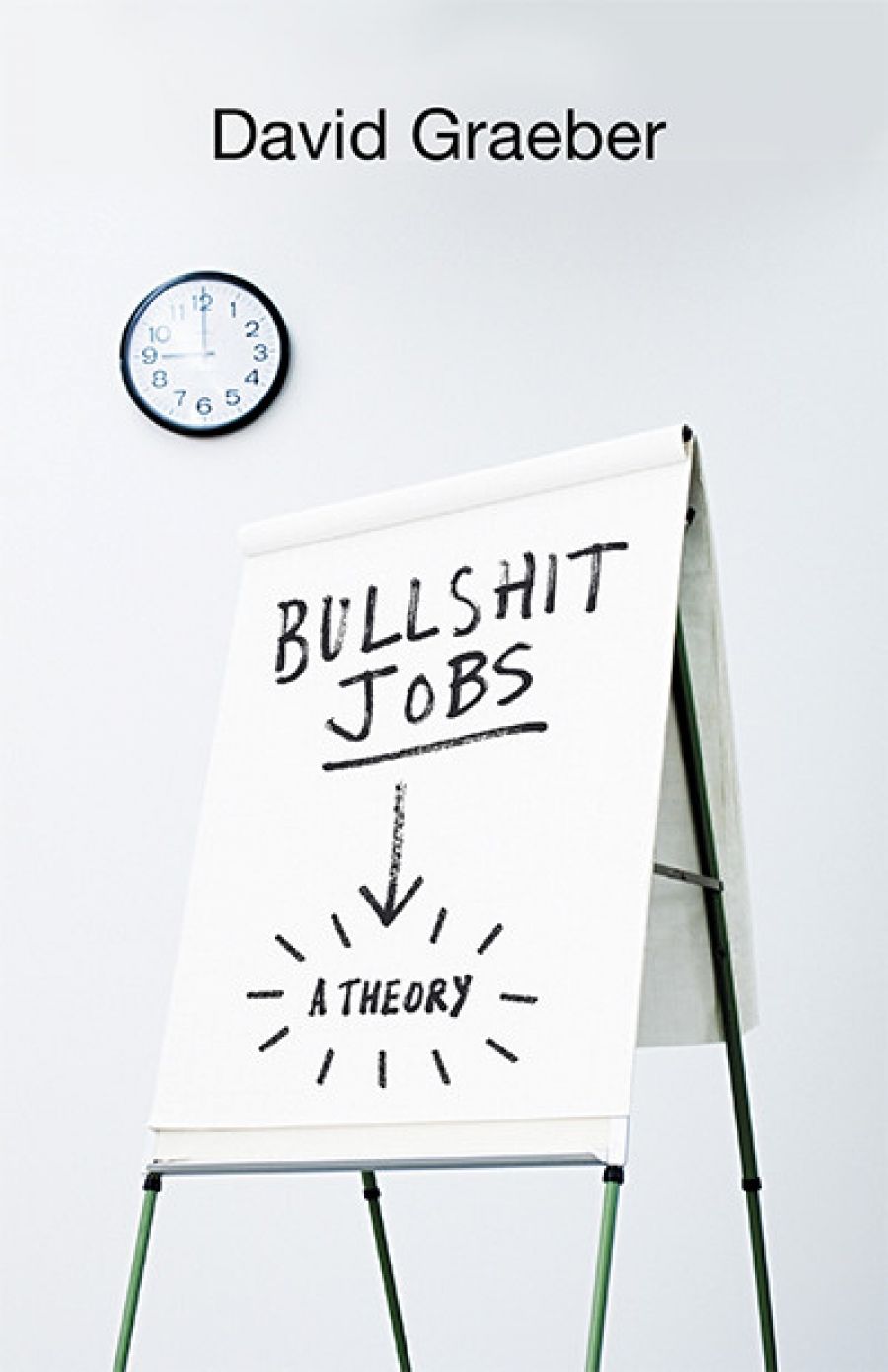
- Free Article: No
- Contents Category: Economics
- Custom Article Title: Gideon Haigh reviews 'Bullshit Jobs: A theory' by David Graeber
- Custom Highlight Text:
Recently I solicited impressions of his job from the new head of external affairs at a big financial organisation. What had struck him first was the manpower at his disposal. The total headcount ran into many hundreds – larger than most if not all Australia’s print and electronic newsrooms. There was not merely one department. Each division of the institution had its own well-resourced team ...
- Book 1 Title: Bullshit Jobs
- Book 1 Subtitle: A theory
- Book 1 Biblio: Allen Lane, $49.99 hb, 358 pp, 9780241263884
Graeber supports his thesis empirically in two ways, both responses to his initial essay. He has sifted 124 online discussions and 250 personal communications collected via Twitter; he cites, repeatedly, a YouGov poll which asked respondents whether their job made ‘a meaningful contribution to the world’? Graeber reports: ‘Astonishingly, more than a third – 37 per cent – said they believed that it did not ... This was almost twice what I had anticipated. So, not only has the hypothesis been confirmed by public reaction, it has now been overwhelmingly confirmed by statistical research.’ The figure is repeated, brandished and elaborated throughout the book, culminating in the proposition that ‘roughly half the economy consists of, or exists in support of, bullshit’.
Errr, no, and it is hard to see how any self-respecting social scientist could present such a compound of anecdote and online polling drawn from a self-selecting sample and devoid of comparative data as evidence. Personally, I’m astonished that so many respondents thought that their jobs did make a meaningful contribution to the world. After all, how many books, works of art, pieces of music do? Are they less worth the effort for not doing so?
 David Graeber (left) with Brian Kelly at a May Day immigrant rights rally, Union Squarwe, New York City (Wikimedia Commons)
David Graeber (left) with Brian Kelly at a May Day immigrant rights rally, Union Squarwe, New York City (Wikimedia Commons)
The individual stories Graeber cites, meanwhile, are readable, often wry, sometimes melancholy. But I’m not sure they amount to ‘proof’, any more than his reverberating assertions amount to more than diverting polemic. The worst torture the respondents seem to have suffered is being temporarily bored. What’s so wrong with that? Without experience of boredom, how would we distinguish the interesting?
The fact is that office work and workers have made an inexact fit since John Stuart Mill was knocking over his tasks at the East India Company in an hour as ‘an actual rest from the other mental occupations which I have carried out simultaneously’, and Bullshit Jobs resembles nothing so completely as those pioneering critiques of corporate conformity written sixty years ago by William H. Whyte (The Organisation Man, 1956), David Riesman (The Lonely Crowd, 1950, with Nathan Glazer and Revel Denney) and C. Wright Mills (White Collar, 1951), with a dash of Parkinson’s Law. Which is fine, except that Graeber manifests next to no interest in history: we get some chunks of Thomas Carlyle, and a few cursory paragraphs about robber barons and scientific management that somehow elides them, when the latter’s precision was actually a reaction against the former’s caprices.
Graeber would have been on far stronger ground had he concentrated not on bullshit jobs but on bullshit work: the homage paid to corporate means, in the form of meetings and messages, appraisals and administrative tasks, that get in the way of functional ends. These are, largely, an outcome of scale, technology, the archaisms of managerialism, the pretensions of presenteeism, and the phenomenon of the free rider; connectivity, meanwhile, has blurred the lines between work and home, to the extent that we carry our job with us, bullshit or otherwise, like a paroled prisoner with his ankle bracelet.
Acknowledgement of other causal factors, however, would not suit Graeber’s politics, a mingling of Marxism and libertarianism which he defines as ‘anarchist’. The best he can do is erect a couple of straw men, touching on arguments that that ‘globalization has rendered the process of production so complicated that we need ever more office workers to administer it’ and that regulation has created ‘an ever-burgeoning number of useless bureaucrats’, before deciding: ‘Both these arguments are wrong and a single example can refute both.’ This is a digression into administrative growth in universities that establishes precisely nothing beyond itself, preluding another airy association: ‘There seems to be an intrinsic connection between the financialization of the economy, the blossoming of information industries, and the proliferation of bullshit jobs.’ What this might be then never really gets answered. We are overdue a considered conversation about the quality of our work, as distinct from a mindless idée fixe with its quantity. Bullshit Jobs is not it.
I would still recommend Bullshit Jobs as an argument starter. It is a pacy, engaging read scattered with provocations, such as that ‘productivity’ is a theological concept underpinned by a ‘variation on a male fantasy of childbirth’, and that nurses and cleaners have contributed more to public health than physicians because most of the improvement in outcomes over time has stemmed from better nutrition and hygiene. But Graeber’s stretching of his essay has attenuated rather than strengthened his thesis: like the existence of those aforementioned external affairs personnel, his book is too little job and too much bullshit.


Comments powered by CComment